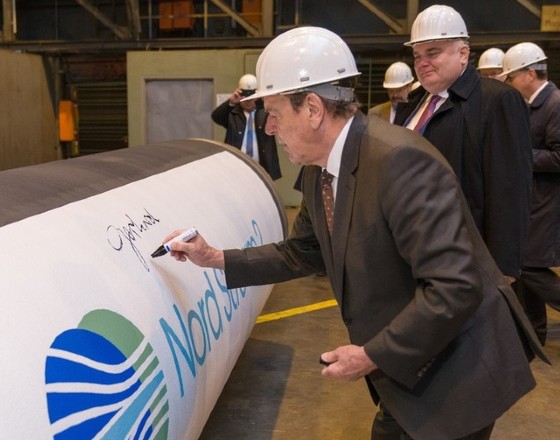
Gerhard Schröder (Nord Stream2/Wolfram Scheible, Public domain)
Russian president, Vladimir Putin, has said Russia is capable of completing the project on its own and that it would be finished either by the end of this year or early next year. But Moscow needs to find a vessel capable of laying the remaining 160 kilometers after the US sanctions legislation in December 2019 halted work by Swiss-Dutch company Allseas on the pipeline.
The delayed pipeline is a crucial issue as the world grapples with a changing international order and pandemic. How it is resolved will be pivotal to how the EU–US and the EU–Russia relations evolve. Many in Central and Southeast Europe (CSE) have seen the pipeline as an attempt by Mr. Putin to undermine EU unity and, perhaps more crucially in Warsaw and Kyiv, bypass them as transit countries and nullify the fees that that accrues them. „Despite Trump’s eccentric behavior, the US tends to keep transatlantic unity, while Putin’s Russia strives to destroy it,” Mykhailo Gonchar, editor of Black Sea Security Journal, based in Ukraine, says.
If completed, the EUR10bn pipeline would double Russia’s direct export capacity to Germany as a first entry point to the EU to 110 billion cubic meters (bcm) per year. Some 1,230 kilometers in length, it is set to run from Russia’s Ust-Luga to Germany’s Lubmin near Greifswald. But 160 kilometers of the pipeline remain incomplete, all in the Danish Exclusive Economic Zone, and the EU is again looking into the project.
US adamant
Reuters quoted Lauren Blair Aronson, a spokeswoman for the US Senator Ted Cruz (R), saying that all options remain on the table to stop Nord Stream 2 from being completed. “There are still sanctions options that were drafted and discussed in 2019, which would significantly broaden the scope of sanctions,” she said. If last year’s bill did not stop the project, Ms. Aronson said, “of course those options will be revisited.”
Democrat Senator Jeanne Shaheen has also been closely monitoring the situation in the Baltic Sea and Russian attempts to circumvent existing sanctions and is evaluating all options, including additional sanctions, the news agency quoted spokesman Ryan Nickel as saying.
The Nord Stream 2 consortium includes Germany’s Uniper, Wintershall-Dea, Royal Dutch Shell, Austria’s OMV and France’s Engie.
EU reactions
“The European Commission considers such sanctions to be contrary to international law and that EU policies and practices should not be determined by the threat or imposition of third country sanctions,” EU representative Sebastian Sass said in May. The EU High Representative Josep Borrell said at Germany’s annual Ambassadors’ Conference, that the EU needs to have a selective engagement with Russia on the issues that matter to Europe.
Nord Stream 2’s application for a derogation was rejected by the German Federal Network Agency in May, and the EU General Court denied legal standing for Nord Stream 2 to appeal against the amended Gas Directive directly. On May 25th, 2020, the Permanent Court of Arbitration published on its website documents showing that the arbitration is proceeding in Toronto.
The EU does not give special treatment to the pipeline, according to the bloc’s Energy Commissioner Kadri Simson. The EU’s Gas Directive, which sets out regulations for all third countries’ (i.e. non-EU ones) suppliers, stipulates that EU gas markets must be open to third country suppliers, have a clear tariff policy and be unbundled (producers from suppliers).
Berlin argues that the conflict between Russia and Ukraine, which was one of the main reasons behind Nord Stream 2, has been settled after a long-term contract for gas transit through Ukraine was signed in 2019.
„Germany has not been very receptive to the US (and some of the CSE countries) critique of the pipeline as a way for Russia to exert additional geopolitical influence in Europe,” said Anna Mikulska from Baker Institute. „But in this context, US sanctions on the pipeline have worked quite well: pushing Russia to sign a gas contract with Ukraine for the next five years of Ukrainian transit,” she added. “Germany,” she went on, “has argued the pipeline is very much a market-driven project and has given little attention to the geopolitical argument. Of course, Germany has a lot to gain from the pipeline, not the least becoming a major natural gas hub for Europe,” she added. „That being said I do not see Germany changing its tune.”
„We have seen a significant decoupling of US and German foreign policy in recent years and I don’t think it will change at this point. In addition, we could see even stronger disagreements emerging within the EU, between opponents and proponents of the pipeline, not something that is helpful in the post-Brexit Europe,” Ms. Mikulska added.
The outcome of the regulator’s deliberations will now come down to the legal definition of what constitutes „completion”. Nord Stream 2 owners argue that although the pipeline isn’t yet fully complete, they had invested EUR5.8bn „irrevocably” in it by May 2019. The consortium — financed by Royal Dutch Shell, Uniper and Wintershall in Germany, France’s Engie and Austria’s OMV — is counting on EU exemptions for projects completed before the May 2019 deadline.
Mateusz Kubiak, senior analyst at Esperis Consulting, a Warsaw-based consultancy firm operating in energy and insurance markets, believes Germany’s regulator is in a bind. „It would be very hard to prove that such a decision is in line with the EU directive. And for sure it would be challenged by some of the European countries,” he said.
Oxford Energy Institute researcher Katja Yafimava said, ”If it does so it this could be seen as Germany finding a way for Nord Stream 2 to operate, as Germany has always said that the pipeline would proceed if post-2019 Ukraine transit is guaranteed — which is the case,” she added.
Polish Prime Minister Mateusz Morawiecki has recently acknowledged that the US sanctions will not stop the pipeline. During a meeting with Putin in Moscow in early February, German Chancellor Angela Merkel said Nord Stream 2 will be implemented „no matter what”.
„It is unhealthy for transatlantic relations for Washington to sanction an energy project in Europe, but it seems that Europe and the US every couple decades has a skirmish over new Russian pipelines into Europe, and nevertheless the relations emerge intact,” professor Brenda Shaffer, a Russia expert at Georgetown University, told DW.
„I think that the importance of Russia to Germany is really exaggerated,” the president of the Center for Global Studies Strategy XXI, Mykhailo Gonchar said. „It’s a consequence of the “Schröderization’ “[pro-Russia policies promoted by the former German Chancellor Gerhard Schröder, who is the Chairman of the Nord Stream Shareholders’ Committee] of some groups in the German political establishment that control the oil and gas business of several German energy companies.”
Meanwhile, global LNG supply is expected to increase by around 34 million tons this year, with 24 million tons of this from the US as supply builds up from LNG trains that started up last year and as more capacity is brought online this year. „The coronavirus is already having a major impact on China’s LNG demand,” gas market expert Andy Flower said. „There are few other places for the additional LNG production to go, so sellers are likely to look to Europe again. So how will Gazprom respond: Will they go for value or volume?”

